The ESCP Academic Board (AB) convened in Beijing on 16 October its 3rd meeting at which programme actions were reported, announced and discussed. Participating as observer was Mr. Rudie Filon, First Secretary of the Cooperation Section of the European Delegation, who wel comed the participants and wished the meeting a full success. Mr. Martin Jeglitza, GOPA backstopping manager for ESCP, also attended the meeting.
It was first up to PMO to report on activities undertaken since January 2006, a list that included successful transfer of funds to five more European Studies Centres, the completion of a methodology of economics course for ESC members, the tender for Academic Book provision and the finalisation of the ESCP sector study. In terms of monitoring and evaluation, PMO's strategic targets were underlined as:
ESCP's Academic Advisor, Prof. Heiduk, and participating members of the AB, reported on the successfully completed evaluation missions to European Studies Centres funded in the first round of calls for proposals. This initiated an interesting discussion of suitable monitoring methods and results.
The other major issue discussed was how remaining ESCP funds would be spent, considering the mid-point at which ESCP has now arrived and the short time left with which to start new administrative procedures. Details are still under discussion with stakeholders.
In September and October, the Directors of PMO and members of the Academic Board, accompanied by ESCP Finance and Accounting Manager and supporting staff, made their interim evaluation of the projects carried out at European Studies Centres funded in the first round of calls for proposals. Taking it in turns to lead the missions, ESCP Directors Prof. Dong and Dr. Wagner and their team at the PMO were welcomed very hospitably by all Centres and given ample chance to see the workings of the Centres for themselves. With the aim of further improvement, the 11 established European Studies Centres awarded grants of between 250,000 and 600,000 euros in December 2005, were being monitored for teaching and research results to date, successful implementation of academic exchanges, financial propriety, and their outlook for a sustainable future. ESC Directors personally reported on their Centres’ achievements and were joined by their research and teaching team in demonstrating their Centres’ personnel and material strengths. Barriers encountered on the route to successful sustainability were openly raised and discussed with the evaluation team in what were important opportunities to exchange ideas about European Studies as well as management techniques.
Also evaluated was the Silk Road Centre for European Studies, the first centre set up under the ESCP and involving an internal network of sub-centres. This ambitious project, headed by Xi’an Jiaotong University, incorporates the Northwestern provinces of Gansu and Shaanxi and the Xinjiang Autonomous Region, not only furthering the Chinese policy of opening up the West, but also bringing into the European Studies fold the part of China most geographically linked to Europe. Among other topics, ongoing research focuses on revitalizing the Silk Road’s entrepreneurial and cultural relations.
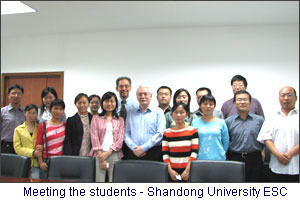
3. Instruction missions to second round of grantees concluded
Instruction missions to the five ESCs granted support in the second round of calls for proposals were carried out during the first half of November. PMO visited Nanjing University’s new European Studies Centre first, followed by the Shanghai Academy of Social Sciences. Then followed visits to China Foreign Affairs University and the University of Political Science and Law. Finally, PMO traveled to Kunming to visit Yunnan University’s European Studies Centre on 15 November. These Centres were awarded funds in July 2006 and have had the summer to execute the first activities proposed in their work plans. At this stage, PMO’s visits ensure that ESCs are on the right track and have not encountered any fundamental problems when starting their projects. As the second call results in projects with a slightly shorter time-span, it is even more essential to get it right from the start.

4. A small but conquerable sector: The market for European Studies outside the university
The result of a year’s investigation by PMO’s Academic Advisor, Prof. Heiduk, has just been finalised. The ESCP Sector Study, which will now be distributed to ESCs, was produced in order to help Centres pave the way towards sustainability beyond the end of the programme. Based on a series of interviews with European enterprises in China, the EU Chamber of Commerce and Chambers of EU Member States, possible future ESC markets are explored. Regarding the supply of expertise in the sector, the study summarises data gathered in interviews and written questionnaires sent to ESCs all over China.
The Sector Study indicates that a market exists for services related to European Studies, but that its diversity and inaccessibility require ESCs to make distinctive efforts in order to open it up. One major finding is that services for Chinese companies wanting to enter the European market are
a much larger and essentially conquerable segment than European companies in China. To provide such kind of services, however, an orientation towards customers′ needs, a corresponding level of specialisation and a strong determination to meet new challenges is needed. Without a clear business orientation and a will to success on the side of the Centres, gaining profit in this field will be hard work indeed.
With the finding that a market and demand exist, this study should give Chinese ESCs the incentive to think carefully about broadening their base of action. In co-operation with some of the Centres, PMO now considers carrying out follow-up studies which will focus on the conditions of corresponding local markets and the development of a strategy on how to combine local conditions with specific advantages and resources of the ESCs.
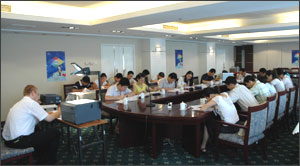
5. Take a fresh look at your European 'ABCs': European Academic Book Collections
The ESCP library support beneficiaries, namely the two European Academic Book Collections (EABC) located at Chinese Academy of Social Science Library in Beijing and Fudan University Library in Shanghai will each be approximately 1000 books richer by the start of next year. Some 16 e-journals on European Studies are already available on the internet at the two EABCs, and copies of articles will be available on the request of members of all other ESCs at the latest by the end of 2006. The first batches of books for the new European Academic Book Collections are due to arrive at Fudan University and CASS between now and the end of January 2007. This contract was recently tendered out and won by the China National Publications Import and Export (Group) Corporation. When fully stocked through this tender, besides serving their own audiences, the EABCs will provide scholars in and outside ESCs throughout China with a strong collection of the most up-to-date and respected literature on European Studies.
A subsidiary aim of the EABCs is to further improve the domestic networking capacity of European Studies Centres. While previous book provision to Chinese ESCs was established at university European Documentation Centres, the EABCs cover a much wider scope of material on historical, cultural, legal and political aspects of European integration, and pool together this reading matter in two substantial collections.
With electronic and printed core material in the main fields of European Studies available domestically, scholars can refocus their overseas exchange visits towards gathering even more specialised reading material and advice. This will be an invaluable step forward in enhancing the expertise of Chinese scholars in European Studies.
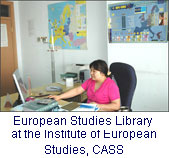
6. ESCP Inside Out:
European Commission monitor at PMO
From 11 to 15 September, Ms Marta Alvarez spent time with PMO and ESCP beneficiaries assessing the programme on behalf of the European Commission. During her monitoring visit, she visited Nankai University, CASS, and the Ministry of Commerce to explore the various perspectives on implementation to date. During her visit to Nankai University in Tianjin, Ms Alvarez said that she was very impressed by the project being carried out at the university’s European Studies Centre, and commented on the commitment and prolific research of the staff in European Studies. Ms. Alvarez remarked that the students and researchers she interviewed expressed their satisfaction that ESCP allows them to improve their analytical skills, obtain information on EU issues not available in China as well as to exchange with European scholars. Her general assessment was that ESCP had successfully overcome delays at the start of implementation and would soon bear the fruit of PMO’s hard work. In her report she gave a positive account of PMO’s management, giving the programme an all round ‘good’ score.
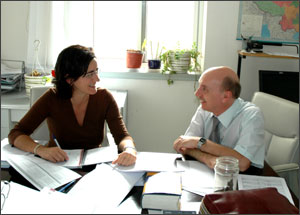
European Commission visit to top ESC
Mr. Samuel Cantell, the desk officer responsible for EU-China projects at the European Commission’s Directorate General for Aid and Cooperation, paid a short visit to Peking University’s European Studies Centre on 28 September, accompanied by the ESCP European Director and the responsible Programme Officer at the European Delegation. A well-established and leading European Studies Centre, PKU ESC is a beneficiary of the first round of calls for proposals and has taken as its overall research topic, “Europe: From Nation States to State of Nations”. Director of the Centre, Prof. Li Qiang, explained what has been achieved in the project so far, particularly in terms of European Studies teaching programmes, and gave Mr. Cantell the chance to meet nine PhD and MA students who will be studying in the Centre’s European partner universities for up to six months with ESCP support. Mr. Cantell expressed his hope that Chinese ESCs would look towards the enlarged Europe 25 in gaining research inspiration, and that scholars would en-deavour to publish more research in European languages, for the greater publicity of Chinese perspectives worldwide.
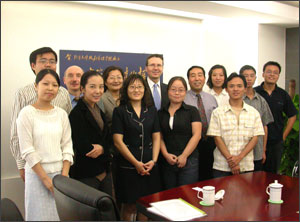
European Delegation monitors
A team of three experts has just finished their mid-term evaluation of ESCP following an intensive three week session at PMO and selected beneficiary ESCs. Following interviews with PMO and Steering Committee members in Beijing, the evaluators visited Sichuan University and Nanjing University ESCs where projects have been running for nine and two months respectively. Those Centres not visited in person were asked to respond to e-interviews, that data of which was to be analysed according to objective and systematic methodology.
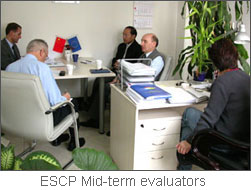
7. Communicating the ESC network
In its work to heighten the visibility of ESCP and European Studies Centres in China, PMO has published and distributed a new colour flyer. An image brochure will be printed soon. From December onwards, contact and research details of European Studies scholars and alumni can be accessed on the internet. To function as e-name cards to strengthen the unity of the ESC network, as well as to generate consultancy opportunities outside the university, each page of the database can hold as little or as much information as the expert wishes to reveal.
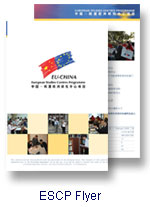
8. Research Methodology Series: Law
Jean Monnet Chair and leading expert in European Law, Prof. Snyder, will teach a two day ESCP training course on the methodology of legal research in late November. To be held on 23 and 24 November in Beijing, this course has attracted the registration of about 20 young scholars and graduate students in European Law. The course will give scholars the chance for high level peer debate, and will focus on four aspects of legal research:
1) The two main methods of teaching and carrying out research on EU law: the method of
positive law, and the method of Law In Context
2) How to read and analyse EU legal documents, focusing on the basic Treaties, legislation,
judicial decisions, secondary literature and policy documents.
3) Research methods in EU law
4) How to innovate and carry out original research on EU law and how to write hypothetical
cases, based on real cases, which can be used in teaching, in negotiating sessions or
as an aid to stimulating imaginative research
9. “Deepening versus Widening: Implications for the EU's global role” Call for Papers for ESCP International Conference in November 2007 under preparation
Based on the ESCP Financing Agreement between China and European Commission, PMO plans to host an International Conference in the last year of the programme, and has now started its pre-paration. The ESCP International Conference to be held in November 2007 aims at creating a forum for China’s European Studies Centres to discuss topics of mutual interest with scholars in Europe and other countries. Particularly welcomed to present will be young aspiring scholars. As this is the only international conference organised under the programme, speakers and partici-pants are asked to give high quality presentations in their efforts to support and position European Studies in the mainstream of academic activities in China.
Global political and economic developments are demanding a more proactive role for the European Union internationally. The conference aims to discuss in which ways integration in Europe – defined as deepening and widening processes – contributes to this challenge for the European Union. According to the preliminary plan of the organising committee, papers which look at the sub-topics of the five sessions from a political, economic, legal, historical and socio-cultural per-spective will be welcomed.
Session I EU in the International Arena
Session II The Constitutional Debate in an Enlarged European Union
Session III Economic and Monetary Governance
Session IV EU and Inter-cultural Dialogue
Session V EU Security and Defence Governance
Session VI EU Environmental Policy
10. European Studies Centres recent news
Domestic Seminar on graduate courses and curriculum of European studies successfully held at Sichuan University
Hosted by Sichuan University, the Seminar on Graduate Courses and Curriculum of European Studies was held in Chengdu from October 8-10. Around 35 researchers and teachers from CASS and fellow ESCs participated. More than 20 participants delivered speeches on the development of basic and disciplinary curricula in politics, economy, law, social culture and religion in Europe. With the heated discussion that followed,interesting comments and suggestions were shared around the table.
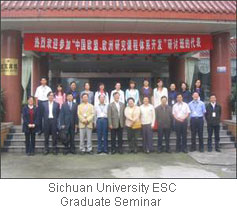
Fudan University ESC International Conference Held
The latest round of EU-enlargement has proved to be a milestone in European integration. It has drawn much attention from both the public and the scholars. Due to the disparities between the new and old member states, and the consequent problems, the last round of enlargement has proved to be controversial as well. To promote a better understanding of the objectives and impact of EU-enlargement, the Centre for European Studies of Fudan University and University of Duisburg-Essen held an international conference, within the framework of ESCP, on ‘EU-Enlargement, Structural Adjustment, and Transition' at Fudan University, Shanghai, China, from 3 to 4 November, 2006.
Renmin University ESC presses ahead with academic exchanges
Wang Xuejun, Wang Junwei and Yin Jiwu, Ph.D students from Renmin University of China (Beijing), are staying for three months at the Center for Applied Policy Research (CAP) at the University of Munich in order to conduct research on transatlantic relations. They constitute a second wave of Chinese students visiting Europe within the framework of the collaborative research project The Impact of EU Enlargement on European Integration and the Global Political Economy which the CAP jointly conducts with Renmin University’s ESC. The first two students stayed in Munich from mid-May to mid-August 2006. They successfully accomplished their research on the economic aspects of EU enlargement at C.A.P.
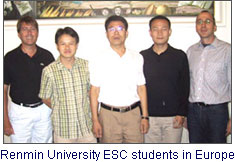
![]() European Studies Centres Programme
European Studies Centres Programme
![]() European Studies,PeKing University
European Studies,PeKing University
![]() European Studies,FuDan University
European Studies,FuDan University
![]() European Studies,Renmin University
European Studies,Renmin University
![]() European Studies,Wuhan University
European Studies,Wuhan University
![]() European Studies,Shandong University
European Studies,Shandong University